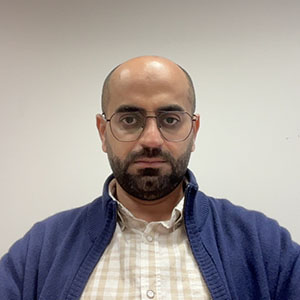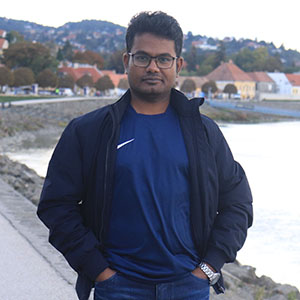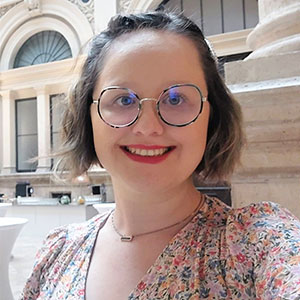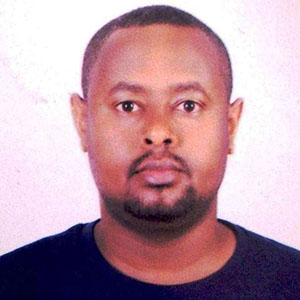Munkatársak és kapcsolat
Munkatársak
Hajdu Miklós
Adjunktus / Assistant Professor
Rektori Szervezet / Társadalom- és Politikatudományi Intézet / Szociológia Tanszék
Dr. Letenyei László
Habilitált egyetemi docens / Habilitated Associate Professor
Rektori Szervezet / Társadalom- és Politikatudományi Intézet / Szociológia Tanszék
Dr. Melegh Attila
Egyetemi Tanár / Professor
Rektori Szervezet / Társadalom- és Politikatudományi Intézet / Szociológia Tanszék
Prof.Dr. Nagy Beáta
Egyetemi tanár / Professor
Rektori Szervezet / Társadalom- és Politikatudományi Intézet / Szociológia Tanszék
Dr. Vicsek Lilla Mária
Egyetemi Tanár / Professor
Rektori Szervezet / Társadalom- és Politikatudományi Intézet / Szociológia Tanszék
Katona Noémi Krisztina
Adjunktus / Assistant Professor
Rektori Szervezet / Társadalom- és Politikatudományi Intézet / Szociológia Tanszék
Pachetti Federico
Adjunktus / Assistant Professor
Rektori Szervezet / Társadalom- és Politikatudományi Intézet / Szociológia Tanszék
Dr. Gál Róbert
Egyetemi Docens / Associate Professor
Rektori Szervezet / Társadalom- és Politikatudományi Intézet / Szociológia Tanszék
Dr. Pásztor Adél
Egyetemi Docens / Associate Professor
Rektori Szervezet / Társadalom- és Politikatudományi Intézet / Szociológia Tanszék
Zoltán Dujisin
Adjunktus / Assistant Professor
Kommunikáció és Szociológia Intézet / Szociológia és Társadalompolitika Tanszék
Jacob Richard Thomas
Adjunktus / Assistant Professor
Rektori Szervezet / Társadalom- és Politikatudományi Intézet / Szociológia Tanszék
Phd hallgatók
Havas V. Bendegúz

Email: v.havas@stud.uni-corvinus.hu
Supervisors: Lilla Vicsek, Márton Bene
Title: The echo chamber is a bell jar – Let’s lift it up!
Short intro: Recent years have witnessed an increase in affective political polarization worldwide, harming democracies, democratic institutions, and citizens. My research explores the causes and potential effects of this process, while aiming to find and test methods to depolarize society through deliberation.
Chayanit Thipr

Supervisor: Adél Pásztor
Topic: To gap or not to gap: exploring gap year study in the context of Thailand
Research interests: My academic focus revolves around the sociology of education, with a specific emphasis on analysing how societal dynamics and social issues shape educational systems and opportunities. This entails investigating educational disparities attributed to factors such as minority status, socioeconomic class, and related factors.
Violeta Orbea Rea

Supervisor: Prof. Nagy Beáta
Topic: The Work-life balance in the life of Pastors and their wives of Protestant churches in Latin America.
Short intro: My study focuses on the perspectives of pastors and their spouses about work-life balance. Latin American workers tend to overlook the significance of work-life balance, and occupations like pastoral counselling that demand intimate contact with those in vulnerable circumstances sometimes cause greater stress for their employees. Additionally, pastors don’t follow a set schedule since there are individuals who require their help at all hours of the day. I’m curious how Pastors handle situations like these and how they adjust their work-life balance to fit their irregular schedules compared to other professions. My research will also look at the WLB of pastors’ spouses since, although wives often have to engage with the Christian community on a similar level to their husbands, their job is seen as a means of supporting the pastor’s primary responsibilities. Additionally, pastors’ spouses typically handle childcare, domestic duties, and some even work outside the home. As a result, part of their personal time may be devoted to supporting their husbands’ work at the church. In this sense, WLB may differ from their husbands in this regard, yet in some way, the wives’ „sacrifice” may support the pastors’ WLB. To promote the wellness of the workers and their families, I wish to contribute to the knowledge of WLB in Latin America, with a particular focus on vocations like the pastorate that demand greater levels of stress and emotional engagement with people.
Ahmed Said Al Ghadani

Témavezető(k): Lilla Mária Vicsek
Kutatási téma: Expectations around artificial intelligence and robotics and the role of these projections in the present – A study of Oman Vision 2040
Short intro: In my research, I am trying to investigate how the integration of Artificial Intelligence (AI) and robotics into society will contribute to shaping the present and future socio-technical pathways in OMAN. Further, I will try to uncover the government’s role in the production of future imagery and its positioning. On one hand, the Omani government is a robust player in creating the nation’s understanding and expectation of AI, however, on the other hand, like any other government, the public and private narratives have an influence on the government.
Ali Md Niamot

Témavezető(k): Vera Messing, Luca Kristóf
Kutatási téma: The Rohingya Humanitarian Crisis in Elite and Public Discourse in Bangladesh
Ayse Aysu Sinik

Témavezető(k): Lilla Mária Vicsek
Kutatási téma: The Effects of Industry 4.0 on the Labor in Turkey
Short intro: A. Aysu Sinik is a third year Ph.D. student. Her research aims to analyze how decision-making mechanisms within companies and necessary government channels are shaped by the labor and automation investment strategies while also considering the technology and business policies of states that promote technology use to enhance economic growth. In so doing, it purports to explain how the workforce is positioned in the new technology systems by employing the theory of sociology of expectations by taking Turkey’s food industry as a case.
Alexandra Bagi

Témavezető(k): Adél Pásztor
Kutatási téma: International Student Mobility in the Transnational Era: Transnational social spaces and mobility capital
Short intro: International student mobility (ISM) is gaining momentum. Hungary is also part of this phenomenon, but the students coming here (especially from the Global East) face significant problems after arrival notably from cultural and social aspects. With my research I aim to connect ISM with transnationalism, transnational social spaces and migration capital to understand the experiences of mobile students. Focusing on how internationally mobile students live their everyday lives, I can also have a better understanding on how their border-crossing relationships and exchanges happen through transnational social spaces. I want to uncover the ways international students can improve their capital throughout their mobility in Europe. Researching social networks in a qualitative way can give a wider picture of how students can utilise their newly created transnational social networks.
Fikadu Tolossa Ayanie

Témavezető(k): Attila László Melegh
Kutatási téma: Ethiopia: Authoritarianism in the Age of Digital Technology
Short intro: My research aims at explaining the authoritarian survival in countries of the Global South that suffer from autocratic rules of varying forms in the age globalization as we undergo massive development in ICTs. In doing so, it attempts to vindicate how intensification digital technology commodifies information, spurring the integration of nations into global market economy in the wake of neo-liberal ideology that reinforces authoritarian power relations by examining the Ethiopian political experiment.
Helga Frech

Email: helga.frech@uni-corvinus.hu
Témavezető(k): Zsuzsanna Elekes, Tamás Bartus
Kutatási téma: Cross-cultural analyses of gender norms in correlation to the gender ratio in delinquency, health, and suicide.
Short intro: The research aims to shed light upon and test empirically, how deviation is different societies and cultural norms connect and hold causality. Cultural differences of norms (believes) and roles (actions) are being compared.
The research tests, weather deviant behavior among males is magnified by gender norm believes within and between societies. The dissertation will measure gender norms by a Cross Country Survey on Cultural and Gender Norms (ESS, WVS) Gender difference in household duties and power in the domestic sphere, gender difference in labor force participation and participation in the social sphere (OECD). Also, the research investigates the within society distributions, clusters, and hierarchies of gender norms (Eurostat). Thus, the studies examine the relation between gender norms and risk behavior: The within society correlation of gendered norms with the presence of risk behavior and delinquents (ESPAD). Latent classes of deviant behavior, alcohol and drug use and delinquent behavior (Latent profile analyses and Structural modeling, ESPAD Hungary). Between society traditional gender norms /as an instrument (IV- SISTER method)/ in relation to risk behavior, health risks, life expectancy, the risk of death by Covid19 (SHARE Survey of Health, Ageing and Retirement in Europe, SHARE Corona Survey,), and higher suicide ratio (WHO) among males (random effects) and the difference between objective and subjective well being in the light of cultural differences.
Ágnes Horváth
Témavezető(k): Lilla Mária Vicsek
Kutatási téma: Critical evaluation of scenarios about the future of work created by Hungarian IT professionals
Virág Ilyés

Témavezető(k): Tamás Bartus, László Lőrincz
Kutatási téma: Social Networks and Individual Labor Market Outcomes – Evidence from Linked Employer-Employee Panel Data
Short intro: The role of social networks in labor markets has been widely recognized for decades. The dissertation focuses primarily on the perspective of individuals and aims to give a deeper understanding of how social networks shape the economic and employment opportunities of individuals. It investigates the direct and indirect effects of professional ties on a wide range of labor market outcomes, such as job finding probabilities, the level of wages, job stability, and the chances for upward mobility in terms of employment outcomes. Following recent trends in the measurement of network effects, the empirical work takes a relatively novel approach to quantify the economic benefits of social ties by exploiting the potential of a large Hungarian linked administrative employer-employee panel dataset. Although direct information on social ties is not available in the dataset, the availability of anonymous firm and individual identifiers makes it possible to identify various segments of networks, such as former co-workers and university peers. Building on studies using similar data, elaborating on the empirical approaches already applied for measuring network-related effects, and incorporating recent developments in panel data methods, the dissertation presents 3 empirical studies on the role of social ties in the labor market. The results, on the one hand, draw attention to the importance of professional ties as essential intermediaries facilitating and directing worker mobility. On the other hand, they provide indications of the downside of networks: social ties may directly or indirectly contribute to maintaining or even increasing existing labor market inequalities.
Merve Burcak Ketene

Témavezető(k): Attila László Melegh
Kutatási téma: Migration Narratives in the Euphrates-Tigris Basin: Local Typologies, Value of Water and the Embedded Environment
Anna Martin

Témavezető(k): József Hegedüs, Adriana Diaconu, Gerard van Bortel
Kutatási téma: Housing Crises in Europe, the new housing precariat in Hungary and Denmark
Short intro: Using the theory of systematically and individually mediated reflexivity this research will demonstrate how individual and structural factors are interlinked and contribute to housing issues together in the context of two countries. The analysis will rehabilitate the juxtapositional approach and describe the contrast and similarities between the Danish and Hungarian housing system with a focus on vulnerable groups. Both countries were affected by the wealth-creating feature of housing as a commodity, that has been reinforced over time, which inevitably made housing costs more expensive. Social and territorial inequalities increased, and a new housing precariat emerged, as the socioeconomic position of the middle class has become unstable. The research will redefine the housing precariat with a mixed research design.
Fruzsina Mikó
Témavezető(k): Beáta Nagy
Kutatási téma: Parental attitudes towards adolescents’ use of technology
Gergely Mónus
Témavezető(k): László Lőrincz
Kutatási téma: Understanding Internal Migration from a Network Perspective
Short intro: The growing importance of agglomerations, spatial spillovers, and other kind of interactions between settlements is widely recognized in urban research. Interestingly, macro-level studies of internal migration – one of the most important underlying social process of urban development – traditionally overlook such effects. Researchers tend to focus on settlements as individual units through gravity or push-pull models. In my proposal I argue that these modeling frameworks are unable to explain migration as a system, a shortcoming that can be overcome by the application of network theory and network models.
Neil Cezar Labay Sapungan

Témavezető(k): Adél Pásztor, Anna Laura Hidegh
Kutatási téma: Ethnographic study on Filipino Students
Andrea Zsuzsanna Nyéki

Témavezető(k): Károly Bozsonyi
Kutatási téma: The World of Work in the Hungarian Television – The Portrayal of Occupations in Hungarian Fiction Series
Orsolya Polyacskó
Témavezető(k): Borbála Göncz, Vera Messing
Kutatási téma: The Politicization of Migration and Integration in Hungary – Claims-making in the media
Flóra Samu
Témavezető(k): Károly Takács, Szabolcs Számadó
Kutatási téma: Collaboration and reliable communication in dynamic networks
Ainura Smailova
Témavezető(k): Borbála Göncz
Kutatási téma: Comparative study of Brazil and Portugal
Borbála Júlia Szczuka

Témavezető(k): Ivett Szalma, Judit Takács
Kutatási téma: Climate change, Covid-19 and Fertility
Réka Tamássy

Email: reka.tamassy@uni-corvinus.hu
Témavezető(k): Zsuzsanna Géring
Kutatási téma: Discursive construction of minorities in Hungarian online political communication
Trần Thị Thúy Hằng

Email: thi.tran@uni-corvinus.hu
Témavezető(k): György Lengyel, Andrew Ryder
Kutatási téma: Climate change, social capital
Short intro: My research focuses on the relationship between social capital and the recovery of the people through social capital. How to use social capital like a tool to adapt with natural disasters. The research will analyse the relationship of individual and community levels for disasters resilience; to understand of the effect of natural disasters on residents’ livelihood; to comprehend how the people do based on social capital when coping pre, during and post-disasters.
Orsolya Udvari

Témavezető(k): Judit Durst, Ivett Szalma
Kutatási téma: Women’s Trauma Narratives in the Hungarian Obstetric Care
Short intro: Orsolya Udvari is a PhD student at the Sociology Doctoral Program at Corvinus University of Budapest since 2021. Her research focuses on the phenomenon of obstetric violence and her topic is women’s trauma narratives in the Hungarian health care system, comparing experiences based on class and ethnicity with qualitative methods.
Eszter Vit
Email: eszter.vit@uni-corvinus.hu
Témavezető(k): Károly Takács, Dorottya Kisfalusi
Kutatási téma: Peer Effects on Educational Aspirations
Sarolta Wichmann

Témavezető(k): László Letenyei
Kutatási téma: Family and social structural changes in China in the light of modernity and migration
Short intro: In the past few decades, China’s economic development has transformed the structure of Chinese society and within it also of families. Both internal and external migration processes have a significant impact on blood relations. The traditional Chinese extended family seems to be disintegrating in the south. Middle-aged men and women who are able to work are looking for work away from home either abroad or on the mainland. Left-behind children and the elderly remain only in the villages. The urban middle class mainly sees the prosperity of their families abroad. The influence of the onechild policy is still felt today, although the male dominance in the cities seems to be declining. In more and more families of urban intellectuals, the value is not only represented by the male child. Gender roles are also being transformed, and femininity and masculinity are taking completely different forms.
Youssef Siwar

Témavezető(k): György Lengyel
Kutatási téma: Entrepreneurial intention among Tunisian university students: the impact of the institutional support
Emeritus / Emerita professzorok
Kapcsolódó elérhetőségek
Faragó Tamás
Professzor Emeritus / Prof. Emeritus
Kommunikáció és Szociológia Intézet / Szociológia és Társadalompolitika Tanszék
Dr. Hrubos Mária Ildikó
Professzor Emeritus / Prof. Emeritus
Rektori Szervezet / Társadalom- és Politikatudományi Intézet / Szociológia Tanszék
Kuczi Tibor
professor emeritus
Kommunikáció és Szociológia Intézet / Szociológia és Társadalompolitika Tanszék
Dr. Lengyel György
Professzor Emeritus / Prof. Emeritus
Kommunikáció és Szociológia Intézet / Szociológia és Társadalompolitika Tanszék
Dr. Ujvári Márta
Professzor Emeritus / Prof. Emeritus
Kommunikáció és Szociológia Intézet / Szociológia és Társadalompolitika Tanszék
Adminisztratív Munkatársak
Staff Office is in Building C Room Nr 535.
Open:
Monday – Thursday: 8:00 – 16:30
Friday: 8:00 – 13:30